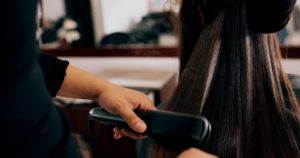Hair Straightening Chemicals Increase Uterine Cancer Risks
December 12, 2022 A recent medical study found a link between hair straightening products, or relaxers, and women’s chance for developing uterine cancer. The study, published by the Journal of the National Cancer Institute, is not the first to demonstrate the concerning connection between certain types of hair care products and cancer. The study’s researchers also highlighted how the findings may carry even more weight for Black women, who report being some of the product’s top consumers.
A recent medical study found a link between hair straightening products, or relaxers, and women’s chance for developing uterine cancer. The study, published by the Journal of the National Cancer Institute, is not the first to demonstrate the concerning connection between certain types of hair care products and cancer. The study’s researchers also highlighted how the findings may carry even more weight for Black women, who report being some of the product’s top consumers.
The Study’s Findings
Researchers collected data from nearly 34,000 participants between the ages of 35 and 74 over an 11-year-period. All the participants involved were sisters of women with cancer, though none of them had cancer themselves. The study’s primary goal was to identify risk factors for breast cancer and other diseases, such as uterine cancer. The American Cancer Society (ACS) reports approximately 65,950 new cases of uterine cancer each year. In addition to new cases, about 12,550 women die from cancers of the uterine body annually as well.
Though cancers of the uterine body account for only 3% of all new cancer cases, they are the most common cancer to affect the female reproductive system. The NIH, or the National Institutes of Health, report that uterine cancer rates are growing, particularly among Black women. The study found that 1.64% of women who never used hair straighteners would go on to develop uterine cancer by the age of 70-years-old; women who frequently used hair relaxing products (four times in a year or more), however, experienced a 4.05% overall increase in risk.
Though there are all sorts of hair products out there, like hair dyes, toners, bleaches, perms, and highlights, no other product has demonstrated a link to uterine cancer like ones that contain hair straightening chemicals (it is important to mention, however, that researchers have found a link between certain hair dyes and breast and ovarian cancers in the past). The study’s authors acknowledge that Black women use hair straightening products more frequently and starting at a younger age than women of other races and ethnicities, largely due to the pressure and discrimination they face from society. Several institutions, like schools and the military, have discriminated against Black women for their natural hairstyles. Discriminating against people based on their hair is still legal in some states; the House only passed a bill to safeguard people against facing these biases earlier this year.
Hair straightening and relaxing products have been implicated for increasing risk factors for hormone-related cancers, like uterine cancer, by several other studies in the past. Despite this data being out there, consumer product manufacturers continue to make, sell, and distribute straighteners that contain chemicals like:
- Bisphenol A
- Parabens
- Formaldehyde
- Certain metals
The researchers postulate that straightening products are more problematic than other hair products because of the increased absorption through the user’s scalp that may be exacerbated by burns and lesions that the straighteners caused. The authors hope that their most recent inquiry will encourage others to take a deeper look at the health disparities in uterine cancer, as well as motivating them to continue studying which specific chemicals create significant risk factors for women.
Uterine Cancer: Other Risk Factors and Symptoms
Using hair straightening products is not the only risk factor for developing uterine cancer. According to the Centers for Disease Control and Prevention (CDC), other risk factors include:
- Being over the age of 50
- Being obese
- Taking estrogen by itself, in the absence of progesterone, for hormone replacement therapy during menopause
- Having difficulty getting pregnant, or having fewer than five periods per year before starting menopause
- Taking tamoxifen, a drug used to prevent and treat certain types of breast cancer
- Having close family members who have had uterine, colon, or ovarian cancer
Possible symptom of uterine cancer to keep an eye out for include any type of vaginal discharge, bleeding, or spotting that is not normal for you. Bleeding can be abnormal because of how heavy it is or when it happens, such as in-between periods or after a woman starts menopause. Bleeding in-between periods is never normal. Other possible signs of uterine cancer include pain and/or pressure in the pelvis. The CDC recommends seeing your doctor right away if you experience any bleeding that is not normal for you, especially if you have already gone through menopause. You should also contact your healthcare provider if you are experiencing any symptoms that last longer than two weeks.
What to do if a Product Makes you Sick
Product manufacturers, suppliers, and sellers have a duty to produce and sell safe products. Despite having this legal obligation, many put aside their responsibilities and endanger consumers in favor of making a profit instead. If you believe that using hair straightening or relaxing products contributed to you developing uterine cancer, someone at our firm can help. To learn more about filing a claim, contact a representative online now to assist you.
Philadelphia Products Liability Lawyers at Galfand Berger, LLP, Representing Injured Victims Since 1947
If you have a question about filing a legal claim, contact the Philadelphia products liability lawyers at Galfand Berger today. Call us at 800-222-USWA (8792) or fill out our online form for a free consultation. Located in Philadelphia, Bethlehem, Lancaster, and Reading, we serve clients throughout New Jersey and Pennsylvania, including Allentown and Harrisburg.
 Google Screened
Google Screened
